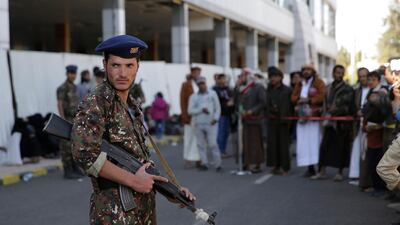A Houthi criminal court based in Sanaa started a trial for 10 Yemeni journalists allegedly held on trumped up charges without notice on Monday, Abdulmajeed Sabra, the lawyer who defends the reporters told The National.
“I was shocked when I was informed on Monday morning that the first hearing session for the 10 journalists I am defending has started, because I have been following their case on a daily basis, and a day before I asked a specialist in charge of the journalists’ case in the court about the date of the first hearing session, he told me that it is planned for next week,” the lawyer said.
“Unless the defendants insisted that I must attend the hearing session, the court would have held the session without a lawyer,” Mr Sabra said.
Mr Sabra sent an appeal to the human rights organisations, the journalists’ unions worldwide to rescue their colleagues because he expects that the 10 journalists could face penalty if the Houthi court continued the fake trail.
“The 10 journalists, all men, have been in the Houthi detention since 2015 for trumped up charges, they have been exposed to torture and mistreatment in the Houthi prisons,” Mr Sabra said.
“The trial is no more than a comic play designed by the Houthis for political purposes, it is not fair at all, and kidnapping them forcibly and detaining them for more than four years is an unjustified procedure,” he said.
According to a copy of the court document — which The National obtained — the Houthi court accused Tawfiq Al Mansouri, Abdulkhaleq Amran, Hesham Tarmoum, Hareth Hameed, Akram Al Waleedi, Essam Balghaith, Hisham Al Yousifi, Haitham Al Shihab, Hassan Anaab and Salah Al Qaedy of publishing false and malicious news, information, rumours and tendentious propaganda in support of the Arab Coalition.
One of the detainees, graphic designer Tawfiq Al Mansouri, was beaten by the Houthi guards "with sticks, cables, iron bars, rifle butts, and their fists, as well as by being forced to hold cinder blocks for several hours and preventing him from drinking water for up to a day," Mr Al Masouri's brother, Abdulla Al Mansouri, told The Committee to Protect Journalists earlier this year.
In June this year, CPJ Middle East and North Africa Program Coordinator Sherif Mansour said in a statement that the Houthis have demonstrated their brutality by holding at least 10 journalists in what by all accounts are deplorable conditions for nearly four years.
“Journalists are not combatants and they must not pay the price for Yemen's conflict. The Houthis should immediately release all journalists in their custody,” Mr Sherif said.
In May this year, Amnesty International said in a statement that the arbitrary detention of 10 journalists for nearly four years by the Houthi de facto authorities is a grim indicator of the dire state of media freedom in Yemen.
“These men are being punished for peacefully exercising their right to freedom of expression. The de facto Houthi authorities should release them immediately and drop all the charges against them. Journalists must be allowed to carry out their work free from harassment, intimidation or threat of arbitrary arrest, prolonged detention or prosecution,” Amnesty International said in its statement.

